第13讲+高一英语暑期讲义(M5U3知识点梳理)(张利)
- 格式:doc
- 大小:274.00 KB
- 文档页数:16
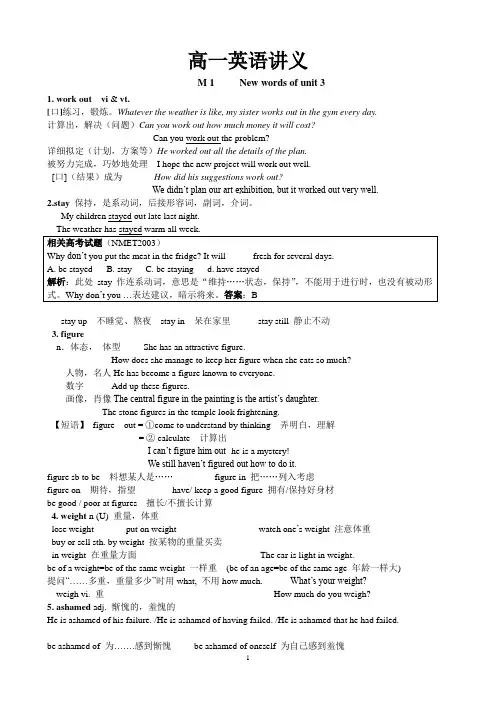
高一英语讲义M 1 New words of unit 31. work out vi & vt.[口]练习,锻炼。
Whatever the weather is like, my sister works out in the gym every day.计算出,解决(问题)Can you work out how much money it will cost?Can you work out the problem?详细拟定(计划,方案等)He worked out all the details of the plan.被努力完成,巧妙地处理I hope the new project will work out well.[口](结果)成为How did his suggestions work out?We didn’t plan our art exhibition, but it worked out very well.2.stay 保持,是系动词,后接形容词,副词,介词。
My children stayed out late last night.stay up 不睡觉、熬夜stay in 呆在家里stay still 静止不动3. figuren.体态,体型She has an attractive figure.How does she manage to keep her figure when she eats so much?人物,名人He has become a figure known to everyone.数字Add up these figures.画像,肖像The central figure in the painting is the artist’s daughter.The stone figures in the temple look frightening.【短语】figure out = ①come to understand by thinking 弄明白,理解= ② calculate 计算出I can’t figure him out- he is a mystery!We still haven’t figured out how to do it.figure sb to be 料想某人是……figure in 把……列入考虑figure on 期待,指望have/ keep a good figure 拥有/保持好身材be good / poor at figures 擅长/不擅长计算4. weight n (U) 重量,体重lose weight put on weight watch one’s weight 注意体重buy or sell sth. by weight 按某物的重量买卖in weight 在重量方面The car is light in weight.be of a weight=be of the same weight 一样重(be of an age=be of the same age 年龄一样大) 提问―……多重,重量多少‖时用what, 不用how much. What’s your weight?weigh vi. 重How much do you weigh?5. ashamed adj. 惭愧的,羞愧的He is ashamed of his failure. /He is ashamed of having failed. /He is ashamed that he had failed. be ashamed of 为…….感到惭愧be ashamed of oneself 为自己感到羞愧be ashamed for sb. 替某人感到羞愧be ashamed to do 对于……感到可耻be ashamed that 感到惭愧6. work vi. 起作用,有效果,奏效The medicine doesn’t work. The plan worked smoothly.It’s a good idea, but it won’t work.相关高考试题-Can I help you, sir? -Yes, I bought this radio here yesterday, but it ______.A. didn’t workB. won’t workC. can’t workD. doesn’t work解析:work运作,运转It doesn’t work.说明此时收音机的状况。
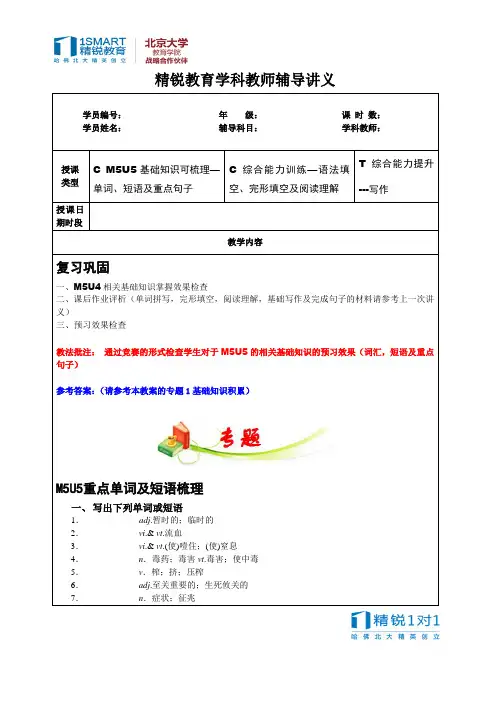
精锐教育学科教师辅导讲义学员编号: 年 级: 课 时 数:学员姓名: 辅导科目: 学科教师:授课类型 C M5U5基础知识可梳理—单词、短语及重点句子 C 综合能力训练—语法填空、完形填空及阅读理解 T 综合能力提升---写作授课日期时段教学内容复习巩固一、M5U4相关基础知识掌握效果检查二、课后作业评析(单词拼写,完形填空,阅读理解,基础写作及完成句子的材料请参考上一次讲义)三、预习效果检查教法批注: 通过竞赛的形式检查学生对于M5U5的相关基础知识的预习效果(词汇,短语及重点句子)参考答案:(请参考本教案的专题1基础知识积累)M5U5重点单词及短语梳理一、 写出下列单词或短语1.____________ adj .暂时的;临时的2.____________ vi .& vt .流血3.____________ vi .& vt .(使)噎住;(使)窒息4.____________ n .毒药;毒害vt .毒害;使中毒5.____________ v .榨;挤;压榨6.____________ adj .至关重要的;生死攸关的7.____________ n .症状;征兆8.____________ vt.& vi.倒;灌;注;涌9.____________ n.典礼;仪式;礼节10.____________ n.救护车11.____________ n.损伤;伤害→____________v.损害;伤害12.____________ n.变化;多样(化);多变(性)→__________adj.各种各样的13.____________adj.轻微的;温和的;温柔的→____________adv.轻微地;温和地14.____________vi.& vt.(使)膨胀;隆起→____________adj.肿胀的15.____________ adj.难以忍受的;不能容忍的→__________v.忍受;容忍16.____________ adj.牢的;紧的;紧密的→____________adv.紧地;牢牢地17.____________ adj.(动作)稳定有力的;坚定的→ ____________adv.坚固地;稳定地18.________vt.& vi.治疗;对待;款待n.款待;招待→________ n.治疗;疗法;对待;待遇19.____________vt.涂;敷;搽;应用;运用vi.申请;;请求;使用;有效→____________n.申请人→____________n.申请(书)20.____________n.压力;挤压;压迫(感)→____________v.挤压;压迫21.病倒________ill22.急救first________23.榨出;挤出squeeze________24.触电;电休克electric________25.品种繁多的;种种的 a ________of26.反复;多次over and over________27.在适当的位置;适当________place28.许多……;若干 a number________29.找到put one's hands________30.区别对待;有影响;起作用________a difference二、翻译句子1.我们把彼此看作兄弟姐妹。
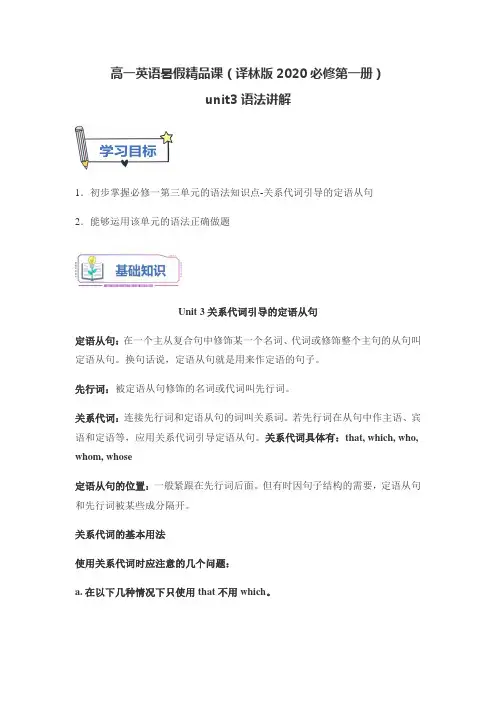
高一英语暑假精品课(译林版2020必修第一册)unit3语法讲解1.初步掌握必修一第三单元的语法知识点-关系代词引导的定语从句2.能够运用该单元的语法正确做题Unit 3 关系代词引导的定语从句定语从句:在一个主从复合句中修饰某一个名词、代词或修饰整个主句的从句叫定语从句。
换句话说,定语从句就是用来作定语的句子。
先行词:被定语从句修饰的名词或代词叫先行词。
关系代词:连接先行词和定语从句的词叫关系词。
若先行词在从句中作主语、宾语和定语等,应用关系代词引导定语从句。
关系代词具体有:that, which, who, whom, whose定语从句的位置:一般紧跟在先行词后面。
但有时因句子结构的需要,定语从句和先行词被某些成分隔开。
关系代词的基本用法使用关系代词时应注意的几个问题:a. 在以下几种情况下只使用that不用which。
1.先行词是不定代词时,如: all, anything, everything, nothing, something, little, few, much。
1.I told him all (that) I know.2.He gave her everything (that) he had.2.先行词被all, every, any, the very, the only, the just等修饰时。
1.I have read all the books (that) you gave me.2.You can take any book (that) you like.3.先行词被序数词和形容词的最高级修饰时。
1. This is the best book (that) I have ever read.2. The second place (that) I want to visit is Shanghai.4.先行词既有人又有物时。
1.We talked about the persons and things (that) we remember in the school.2.The people and the animals that were killed in the earthquake have all been found.5.在Who, Which引起的疑问句中。
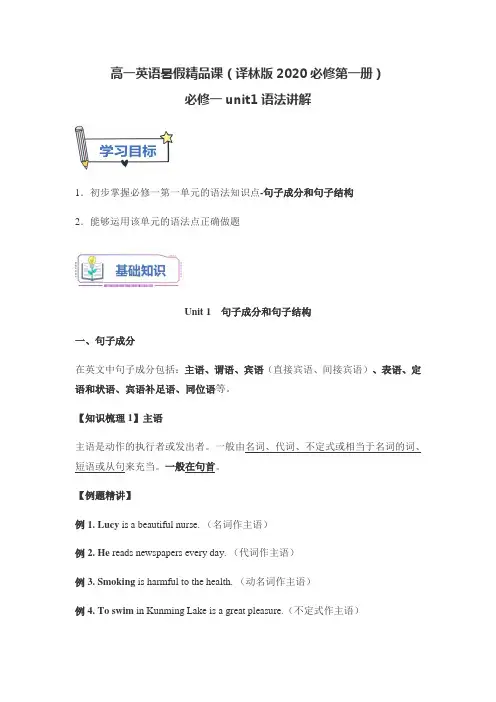
高一英语暑假精品课(译林版2020必修第一册)必修一unit1语法讲解1.初步掌握必修一第一单元的语法知识点-句子成分和句子结构2.能够运用该单元的语法点正确做题Unit 1句子成分和句子结构一、句子成分在英文中句子成分包括:主语、谓语、宾语(直接宾语、间接宾语)、表语、定语和状语、宾语补足语、同位语等。
【知识梳理1】主语主语是动作的执行者或发出者。
一般由名词、代词、不定式或相当于名词的词、短语或从句来充当。
一般在句首。
【例题精讲】例1. Lucy is a beautiful nurse. (名词作主语)例2. He reads newspapers every day. (代词作主语)例3. Smoking is harmful to the health. (动名词作主语)例4. To swim in Kunming Lake is a great pleasure.(不定式作主语)例5. What we should do is not yet decided. (从句作主语)【知识梳理2】谓语说明主语“做什么”,“是什么”或“怎么样”。
谓语必须是动词。
谓语和主语在人称【例题精讲】例1. His parents are teachers. (系动词作谓语)例2. We study hard.(行为动词作谓语)例3. We don’t finish reading the book.(助动词和行为动词一起作谓语)例4. He can speak English. (情态动词和行为动词一起作谓语)【知识梳理3】宾语宾语是动作、行为的承受者,由名词、代词、不定式或相当于名词的词、短语或【例题精讲】例1. She is doing her homework now.(名词作宾语)例2. We often help him.(代词作宾语)例3. He likes to play basketball.(不定式作宾语)例4. We enjoy listening to the music. 我们喜欢听音乐。
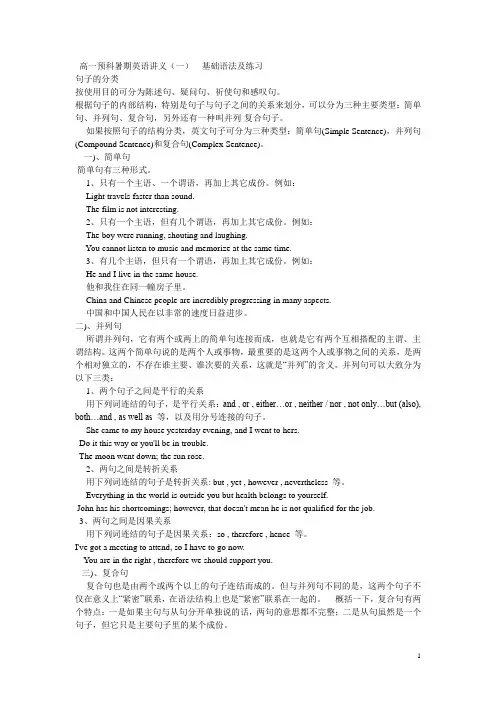
高一预科暑期英语讲义(一)基础语法及练习句子的分类按使用目的可分为陈述句、疑问句、祈使句和感叹句。
根据句子的内部结构,特别是句子与句子之间的关系来划分,可以分为三种主要类型:简单句、并列句、复合句,另外还有一种叫并列-复合句子。
如果按照句子的结构分类,英文句子可分为三种类型:简单句(Simple Sentence),并列句(Compound Sentence)和复合句(Complex Sentence)。
一)、简单句简单句有三种形式。
1、只有一个主语、一个谓语,再加上其它成份。
例如:Light travels faster than sound.The film is not interesting.2、只有一个主语,但有几个谓语,再加上其它成份。
例如:The boy were running, shouting and laughing.You cannot listen to music and memorize at the same time.3、有几个主语,但只有一个谓语,再加上其它成份。
例如:He and I live in the same house.他和我住在同一幢房子里。
China and Chinese people are incredibly progressing in many aspects.中国和中国人民在以非常的速度日益进步。
二)、并列句所谓并列句,它有两个或两上的简单句连接而成,也就是它有两个互相搭配的主谓、主谓结构。
这两个简单句说的是两个人或事物,最重要的是这两个人或事物之间的关系,是两个相对独立的,不存在谁主要、谁次要的关系,这就是“并列”的含义。
并列句可以大致分为以下三类:1、两个句子之间是平行的关系用下列词连结的句子,是平行关系:and , or , either…or , neither / nor , not only…but (also), both…and , as well as 等,以及用分号连接的句子。
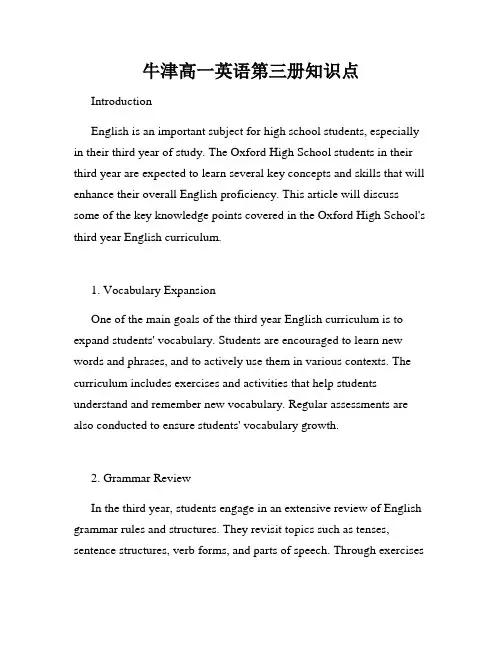
牛津高一英语第三册知识点IntroductionEnglish is an important subject for high school students, especially in their third year of study. The Oxford High School students in their third year are expected to learn several key concepts and skills that will enhance their overall English proficiency. This article will discuss some of the key knowledge points covered in the Oxford High School's third year English curriculum.1. Vocabulary ExpansionOne of the main goals of the third year English curriculum is to expand students' vocabulary. Students are encouraged to learn new words and phrases, and to actively use them in various contexts. The curriculum includes exercises and activities that help students understand and remember new vocabulary. Regular assessments are also conducted to ensure students' vocabulary growth.2. Grammar ReviewIn the third year, students engage in an extensive review of English grammar rules and structures. They revisit topics such as tenses, sentence structures, verb forms, and parts of speech. Through exercisesand practice, students reinforce their understanding of these grammar concepts and improve their accuracy in using them.3. Reading ComprehensionThe third year curriculum places a strong emphasis on improving students' reading comprehension skills. Students are exposed to a variety of reading materials, including fiction, non-fiction, and articles. They learn strategies to analyze and understand the main ideas, supporting details, and author's purpose. Furthermore, they develop critical thinking skills by evaluating texts and forming their own opinions.4. Writing SkillsAnother important component of the third-year English curriculum is the development of writing skills. Students are taught various types of writing, such as essays, reports, and narratives. They learn proper essay structure, paragraph organization, and grammar usage. Additionally, students practice editing and revising their own writing to enhance clarity, coherence, and cohesion.5. Speaking and ListeningTo improve students' oral communication skills, the third year curriculum includes activities that focus on speaking and listening. Students participate in discussions, engage in public speaking exercises, and practice listening for specific information. They enhance their ability to express opinions, present information, and comprehend spoken English.6. Cultural AwarenessIn addition to language skills, the third year English curriculum aims to develop students' cultural awareness and intercultural communication skills. Students learn about English-speaking countries' customs, traditions, and literature. They engage in cross-cultural discussions and presentations, fostering mutual understanding, and respect for different cultures.ConclusionThe Oxford High School's third year English curriculum provides students with a comprehensive foundation in the English language. By focusing on vocabulary expansion, grammar review, reading comprehension, writing skills, speaking and listening, as well as cultural awareness, students are equipped with the necessary tools and knowledge to become proficient English speakers, readers, and writers.。
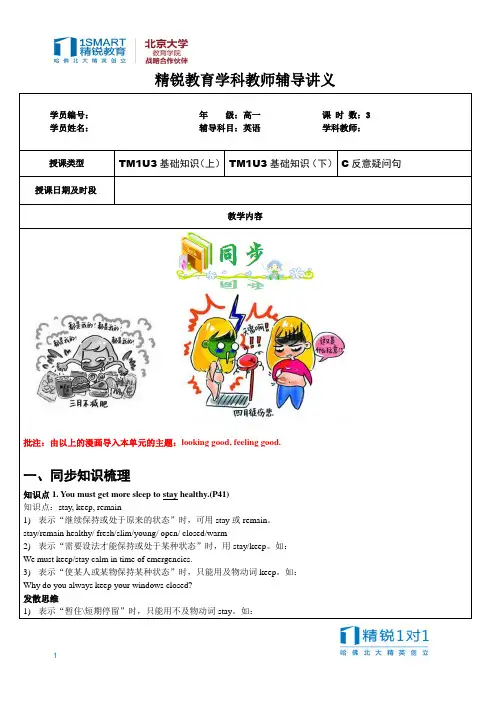
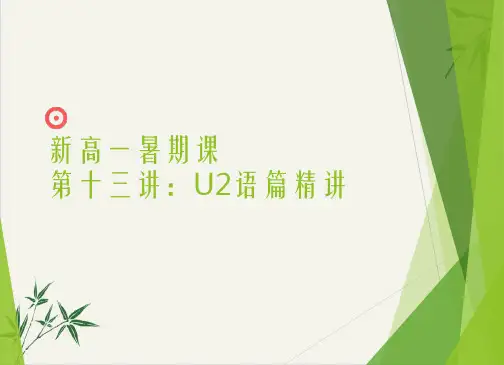
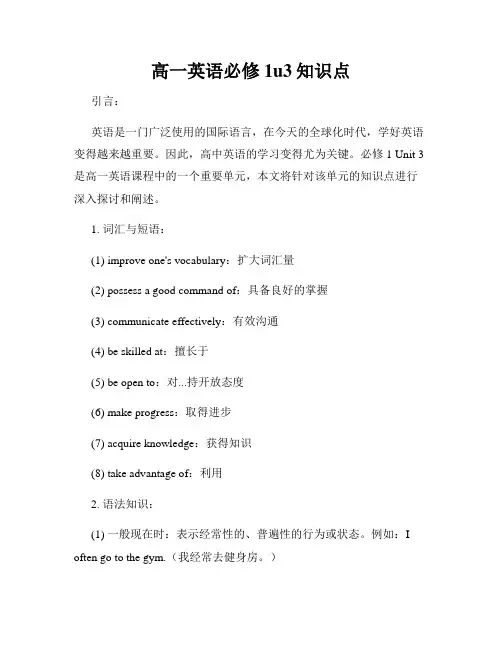
高一英语必修1u3知识点引言:英语是一门广泛使用的国际语言,在今天的全球化时代,学好英语变得越来越重要。
因此,高中英语的学习变得尤为关键。
必修1 Unit 3是高一英语课程中的一个重要单元,本文将针对该单元的知识点进行深入探讨和阐述。
1. 词汇与短语:(1) improve one's vocabulary:扩大词汇量(2) possess a good command of:具备良好的掌握(3) communicate effectively:有效沟通(4) be skilled at:擅长于(5) be open to:对...持开放态度(6) make progress:取得进步(7) acquire knowledge:获得知识(8) take advantage of:利用2. 语法知识:(1) 一般现在时:表示经常性的、普遍性的行为或状态。
例如:I often go to the gym.(我经常去健身房。
)(2) 现在进行时:表示现在正在进行的动作。
例如:She is studyingin the library.(她正在图书馆里学习。
)(3) 一般过去时:表示过去某个时间点或一段时间内发生的动作。
例如:I visited my grandparents last weekend.(我上个周末去拜访了我的祖父母。
)(4) 过去进行时:表示过去某个时间点正在进行的动作。
例如:He was watching TV when I entered the room.(当我进入房间时,他正在看电视。
)3. 阅读技巧:(1) 首先,通过快速浏览文章来获取整体语境和大意。
(2) 其次,注意关键词和主题句,以帮助理解文章的结构和内容。
(3) 接着,注意上下文暗示和词汇提示,以推断词义和理解句子的含义。
(4) 最后,注意文章的逻辑关系和段落之间的过渡,以帮助全面理解文章。
4. 写作技巧:(1) 选择恰当的词汇和短语,以提高语言的表达能力。
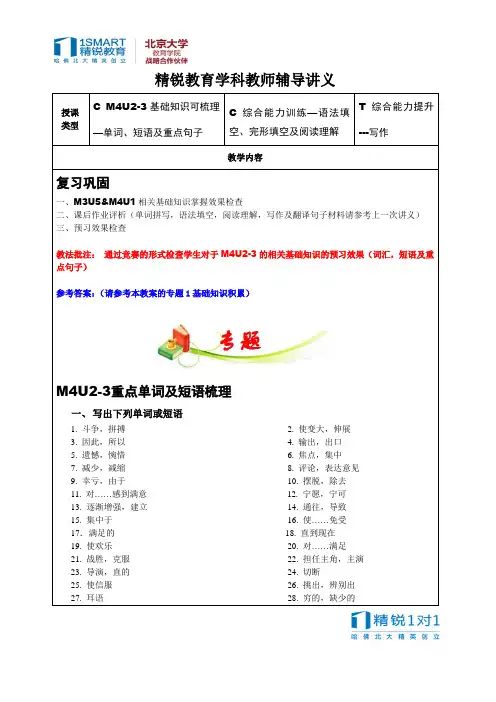
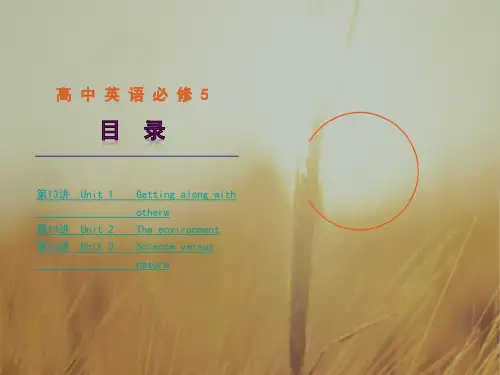
高一英语unit13课件高一英语unit13课件在教高中的时候,老师们都有准备课件的.,下面是的高一英语unit13课件,欢迎阅读。
Words and PhrasesWhat’s wrong with you?/What’s the matter with you?Lie down and let me examine you.Let me have a look.Where does it hurt?Drink plenty of water and get some rest.I’ve got a pain here. This place hurts.There’s something wrong with back/my knee/my arm.I don’t feel well.1. Master the function use of language as defined above.2. Help the students to finish the tasks of listening, reading, writing, speaking presented in the book and the exercise book through using what the students have learned.Learn the text about healthy eating. Get the students know about the basic knowledge of how to eat healthily.1. Talk about different kinds of food that one favorites.2. learn the basic knowledge of healthy eating.3. learn how to say in the clinic.4. Grasp the language points and grammar in the text.Step 1 Warming-UpFirst show the students some pictures of dishes and soto introduce the topic of this unit.And then show the pictures on their text books and let them to decide what is junk food and what is not.Here the students may have a short ask and answer in pairs to themselves more engaged in the topic.Step 2 ListeningLet the students listen to the tape and be prepared to answer the questions below.Step 3 SpeakingShow the students the three situations as on P2. Then ask the students to prepared a dialogue aording to the examples in pairs. Ask several pairs of students to present their dialogueAfter that list the useful expressions in their dialogue.Step 4 HomeworkPrepare for the next class.Collect some menus if possible for the next class.Step 1 IntroductionUsing the questions on P3 to introduce the new text.Step 2 Fast-reading1.What does the “fuel ” mean in the first paragraph?(It means different kinds of materials, such as protein, Calcium that we need to keep healthy.)2.What do we have to consider when we choose to buy or eat?(What kinds of nutrients that the food contain.)3.What made our eating habit changing?(Many things: what people believe, advice from panies and stores.)4. How can we feel and look fine?(We ought to learn about our body and the fuel it needs to keep fit.)Explain the language points if necessary.Step 3 Carefully-readingHow many parts can be divided into?(Three parts.)What’s the main idea of each part?(1.our eating habits are changing. 2.why the eating habits are changing 3.the best way to develop healthy eating habits.)Step 4 TalkingAsk the students to take out their menus and read them carefully. Then prepare a dialogue that may happen between a customer and a waiter/waitress.Step 5 HomeworkFinish the exercise --- Vocabulary on P5. and P72-73Step 1 RevisionCheck the homework.First present the students the modal sentences with Modal Verbs and ask the students to make some sentenceswith them.Step 3 Consolidation(1) Finish the exercise on P5 and on P74(2)Take out a piece of paper with the column “Ask###” in order to make the students understand when you are giving advice it is better to use some sentences with had better (not), and ought(not) to, should(not). Then read a passage as an example and afterwards list the points you have to pay attention to when you give advice.1.give advice that will really help the person.2. be polite and sincereat last get the students to finish the following practice.Step 4 HomeworkFinish the exercise 3 on P74 in the students’ workbook.Step 1 RevisionLet some students read their reply to the letters onP74.Step 2 ReadingRead the text on P6 and then get the students to find the main idea of it (Snacks is also important . we need to learn something about snacks and the way to prepare it.)Ask the students to work in pairs to write the recipe for their favourite dish.We may first give the tips on P7 as a guide.Step 4 DiscussionFirst ask the students to read the passage on P75 and then give the following questions as the topic for the students to talk: What is a couch potato?What does one have to pay special attention to in order to keep healthy? (food and exercise etc.)Step 5 HomeworkDo a general survey in order to learn about the differences between people’s eating habits and try to find which is healthier.。
高一英语第三节知识点IntroductionIn this article, we will explore the key knowledge points covered in the third section of the English curriculum for high school freshmen (Grade 10). These knowledge points are fundamental to developing a strong foundation in English language skills and understanding. By mastering these concepts, students will be equipped to progress confidently in their English studies. Let's dive into the essential topics covered in this section.1. Vocabulary ExpansionIn the third section of the English curriculum, students will focus on expanding their vocabulary. Learning new words is crucial for effective communication and comprehension. Emphasis will be placed on recognizing and understanding words in context, as well as practicing word usage through various exercises and activities. Students will explore topics such as synonyms, antonyms, idioms, and collocations. Regular vocabulary building exercises will help students develop a wide range of vocabulary.2. Grammar and Sentence StructuresMastery of grammar and sentence structures is vital in forming coherent and grammatically correct sentences. In this section, students will learn about different tenses, sentence types (simple, compound, complex), subject-verb agreement, verb forms, adjectives, adverbs, prepositions, and conjunctions. Through extensive practice, students will strengthen their understanding and application of these grammar rules, allowing them to construct accurate and meaningful sentences.3. Reading ComprehensionReading comprehension plays a significant role in language learning. In this section, students will enhance their ability to understand and interpret various types of texts. They will learn techniques such as skimming, scanning, and inference, which will aid in extracting information effectively. Different genres like fiction, non-fiction, news articles, and essays will be explored to expose students to diverse reading materials. By analyzing these texts, students will improve their critical thinking and inferential skills.4. Writing SkillsDeveloping excellent writing skills is essential for effective communication. In this section, students will learn the principles of writing different types of texts, such as narrative, descriptive, expository, and argumentative essays. They will be guided through theprocess of brainstorming, organizing ideas, and structuring their writing. Emphasis will be placed on paragraph development, coherence, and cohesion. Students will also practice proofreading and editing their work to improve accuracy and clarity.5. Listening and SpeakingThe ability to listen and speak fluently is crucial for effective communication in English. In this section, students will practice listening to various audio resources such as dialogues, interviews, lectures, and speeches. They will learn to identify main ideas, understand details, and extract specific information from spoken English. Additionally, students will engage in conversational activities to enhance their speaking skills, including discussions, presentations, and role-plays. Pronunciation and intonation exercises will also be integrated to develop clear and natural speech patterns.ConclusionIn the high school freshman English curriculum, the third section covers several important knowledge points, including vocabulary expansion, grammar and sentence structures, reading comprehension, writing skills, and listening and speaking. By focusing on these areas, students will acquire a solid foundation in the English language, enabling them to progress further in their language learning journey.。
高一(预科)暑期英语讲义(三)Unit 1 friendship 强调句式“强调”就是使句子的某一部分比一般情况下显得更加重要。
英语表达中,要强调句子的某一成分,一般可用强调句型“It is (was) +that (who) +句子的其余部分”。
It在句中无意义,只起引出被强调部分的作用。
被强调的部分指人时,除可用that外,还可换用who(强调宾语指人时也可用whom)。
使用强调句型时,应注意以下事项:一、去掉强调结构It is (was) … that(who)…后,剩下的词仍能组成一个完整的句子。
这是判断是不是强调句型的关键。
试比较:1. It is strange that he didn’t come yesterday.2. It is you and Tom that didn’t come yesterday.3. It is what you do rather than what you say ____matters. (05天津)A .that B. what C. which D. this4. That was really a splendid evening. It’s years ____I enjoyed myself so much.A. whenB. thatC. beforeD. since (安徽)二、如果强调时间、地点、原因或方式状语时,不可用when, where, why或how,而仍用that。
1. It was not until midnight ____ they reached the camp site.A. thatB. whenC. whileD. as2. It was after he got what he had desired ____he realized it was not so important.A. thatB. whenC. sinceD. as3. It was in New Zealand ___ Elizabeth first met Mr. Smith.A. thatB. howC. whichD. when三、注意强调句型的否定句和疑问句形式,在这方面很容易因弄不清句子结构而错选。
高一英语暑假专题〔五〕人教实验版【本讲教育信息】一. 教学内容:暑假专题〔五〕:定语从句要点归纳二. 重、难点讲解1. 定语从句的概念:在复合句中,修饰某一名词或代词的从句。
2. 正确选用关系词关系代词:that, which, who, whom, whose, as关系副词:where, when, whye.g. 1) The road which / that was destroyed in the earthquake has now been built stronger.2) The men who / that have made a lot of money do not know what to do with their money.3〕The person whom / that you just met is Mr.Li.4) The boy whose mother didn’t know the truth had been killed in a road accident.5) It is the desk whose leg was repaired by Tom.6) I’ll never forget the day when we once stayed together.7) This is the factory where my uncle works.3. 关系代词只能使用that的几种情况1) 先行词是不定代词all, much, little, none, the one something, everything, anything, nothing, 时。
2) 先行词前面有only, any, few, little, no, all, very 时。
3〕先行词是形容词最高级、或它前面有形容词最高级时。
4〕先行词是序数词或它前面有一个序数词时。
暑假作业132021年新高二暑假精品课程之巩固+夯实+突破解析版【学习目标】Part 1 巩固Unit 3 Faster, higher, stronger 本单元需巩固记忆重点单词1.bounce 2.teammate 3.self-belief 4.cheat 5.yoga6.eback9.defeat10.steely11.semi-final12.seize13.quarter-final14.teamwork15.tournament16.intense 17sharpen18.sharp19.sharply 20.remarkably本单元需巩固记忆重点短语1.a far cry from 2.give way 3.follow in one's footsteps 4.carry on 5.beyond one's expectations6.in a row7.burst onto8.pay off9.set out to do sth.10.get sth. back11.at the time12.set about 13.set off 14.set aside 15.set down 16..set free 17.seize on/upon18.burst with anger/joy 19.seize sb. by the arm 20.seize the chance/opportunity to do sth.Part 2 夯实Unit 3 Faster, higher, stronger1.associated2.association3.to see4.to be5.remarkable6.by7.on/upon8.with9.into10.preparing11.remarkably12.was assigned 13.into 14.Unexpectedly 15.for 16.It17.shopping18.preparing19.shiny 20.asidePart 3 突破答案+详解阅读理解CBDD七选五. . EGBCA完形填空CADCD CACCA AADBA语法填空1.has_become 2.them 3.increase 4.Recently 5.to6.discoveries 7.which 8.are 9.the 10.damaging详解阅读理解本文是一篇记叙文。
2011暑假必备宝典之高一英语知识点总结Unit13-141. Our eating habits have changed, as has our way of life.2. Only in this way will we be ready for the challenges andopportunities in life.3. Each time we celebrate a festival it change a little.4. It is not a sad day, but rather a time to celebrate thecycle of life.5. Not all of them are bad for us.6. Some food does have nutrients.7. There seems to be no other choice.☆重点词汇☆1.examine vt. 检查2. energy n. 精力,能量3. fuel n. 燃料,营养物4. diet n. 日常饮食5. product n. 产品6. mineral n. 矿物7. function n. vi. 功能,作用,起作用8. chemical n. adj. 化学制品,化学的9. balance vt. vi. 平衡10. supplement n. 补充11. fit adj. 健康的,适合的 v.适合12. digest vt. 消化,领会13. gain vt. 增加,获得14. sleepy adj. 困乏的15. tasty adj. 可口的16. symbol n. 象征17. conflict n. 冲突18.argument 7j.争论19. honour n. vt. 荣誉,给以荣誉20. ancestor n. 祖先,祖宗21. respect vt. 尊敬22. celebration n. 庆祝23. light vt. 点燃,照亮24. faith n. 信任,忠实25. creativity n. 创造力26. purpose n. 目的,意图27. principle n. 法则,原则28. commercial adj. 商业的,贸易的29. similar adj. 相似的30. advise vt. 建议,劝告。
精锐教育学科教师辅导讲义学员编号: 年 级: 课 时 数:学员姓名: 辅导科目: 学科教师:授课类型 C M5U3基础知识可梳理—单词、短语及重点句子 C 综合能力训练—语法填空、完形填空及阅读理解 T 综合能力提升---写作授课日期时段教学内容复习巩固一、M5U2相关基础知识掌握效果检查二、课后作业评析(单词拼写,语法填空,阅读理解,基础写作及翻译句子的材料请参考上一次讲义)三、预习效果检查教法批注: 通过竞赛的形式检查学生对于M5U3的相关基础知识的预习效果(词汇,短语及重点句子)参考答案:(请参考本教案的专题1基础知识积累)M5U3重点单词及短语梳理一、 写出下列单词或短语1.____________ n .方面;层面2.____________ adj .在前的;早先的3.____________ n .指导;向导;导游vt .指引;指导4.____________ vt .容忍;忍受5.____________ vi .& vt .缺乏;没有n .缺乏短缺的东西6.____________ vt .系牢;扎牢7.____________ n .开关;转换vt .转换8.____________ vt.& vi.(使)闪光;(使)闪现9.____________ adj.乐观(主义)的10.____________ n.沙漠;荒原11.____________ n.原料;材料12.____________ vt.回收利用;再利用13.____________n.代表;典型人物adj.典型的;有代表性的14.____________n.动机15.____________ n.印象;感想;印记→_____ _______v. (使)印象深刻;铭记16.____________ adj.时常发生的;连续不断的→__________adv.不断地17.____________ n.周围的事物;环境adj.周围的→___________v._环绕;包围18.____________vt.& vt.按;压;逼迫n.按、压;印刷;新闻→_________n.压力;挤压;压迫19.____________n.瞬间;片刻adj.立即的;立刻的→____________adv.立即;立刻20.____________n.定居;解决→____________v.解决;定居→____________n.定居者21.拿起;接受;开始;继续take ________22.(困境后)恢复;完全复原be back ________one's feet23.看不见……lose sight________24.打扫;横扫sweep________25.(快捷而悄声地)移动;溜进……slide________26.加速speed________27.结果________ a result28.与……相似be similar ________29.向四面八方________all directions30.带领某人参观show sb.________二、翻译句子1. 我们鼓励每一位学生参加一项新的体育运动或者尝试一种新的锻炼方式。
(take up)___________________________________________________________________2.我感到非常害怕,因为在人群中看不到我的妈妈。
(lose sight of)___________________________________________________________________3.充足的新鲜空气和体育锻炼将加速他的康复。
(speed up)___________________________________________________________________4.那么你干嘛不把你能拿得出的钱都交给我呢?(why not)___________________________________________________________________5.小男孩放松地躺在沙发上。
(形容词作状语)___________________________________________________________________6. 她出生于北京的一个工人家庭,5岁就开始打乒乓球。
(过去分词作状语)___________________________________________________________________7.在一天辛苦工作之后,Mrs. Jones 感到筋疲力尽,她上楼时好像一名迟暮的老人。
(so … that …; as if)___________________________________________________________________8.在股票市场亏损了所有的资产之后,他过了好多年才在资金方面恢复过来。
(before…;be back on one’s feet)___________________________________________________________________9. 世上的一切事情都在不断地发生着变化。
___________________________________________________________________10. 我们应该乐观向上,永远对生活保持一种积极的态度。
(be optimistic)___________________________________________________________________11. 警方发现公共汽车司机该为事故负责。
(blame… fo r…)___________________________________________________________________12.在未来,我们希望我们能够建立一个环保地回收垃圾的系统。
(where引导的定语从句)___________________________________________________________________Keys:一、写出下列单词或短语1.aspect2.previous3.guide4.tolerateck6.fasten7.switch8.flash9.optimistic 10.desert11.material 12.recycle13.representative14.motivation15.impression;impress 16.constant;constantly17.surrounding;surround 18.press;pressure19.instant;instantly 20.settlement;settle;settler 21.up22.on 23.of24.up25.into26.up27.as28.to29.in 30.around二、翻译句子1. We encourage each student to take up a new sport or to try a new form of exercise.2.I felt very frightened,for I lost sight of my mother in the crowd.3.Plenty of fresh air and exercise will speed up his recovery.4.So why not give me all the money you can spare?5.The boy lay on the sofa,relaxed.6. Born into a worker’s family in Beijing, she began to play table tennis at the age of five.7. After a day’s hard work, Mrs. Jones was so exhausted that she climbed the stairs as if she wasan old woman.8. After losing all his money in the stock market it was many years before the man can get backon his feet financially.9. Everything in the world is constantly changing.10. We should be optimistic and always keep a positive attitude towards life.11. The police found that the bus driver was to blame for the accident.12. In the future, we hope we can develop a system where waste can be recycled in anenvironmentally friendly way综合能力训练一、语法填空The passage is about a letter written by Li Qiang ___1_____ is taking up the prize that he won last year. At first he was nervous and 2.________(certain) about the journey. However,3.________Wang Ping's guiding,Li Qiang was transported into the future safely. Hit by a lack 4.________fresh air,his head ached and he tried to make the necessary 5.________(adjust) to this new situation. Soon he was back on his feet again ___6____flew after Wang Ping in a hovering carriage 7.________(drive) by computer. Arriving at Wang Ping's house,Li Qiang was shown into a large room with a green wall8.________(make) of trees,9.________leaves provided the room with oxygen.10.________(exhaust),Li Qiang slid into bed and fell fast asleep.二、完形填空If you think about the future and come up with nothing but a question mark,then you’ve got some 1 to make. This might seem like a 2 undertaking, but the flip side (另一方面) of this situation is that if your future is wide open then there are many exciting 3 you can explore.Taking a gap year, 4 your education,undertaking an apprenticeship(学徒)and landing your first job are all options 5 to you, so now it‟s just up to you to 6 the future!Taking a gap year is 7 a long term option for teenagers leaving secondary school, but for a few months or even a few years it might 8 you well.Today British 9 can be found backpacking around the world, working their way across a few Continents, 10 for international charities and even working with the 11 at home in the UK.Gap years are a great choice for teens looking to pause before carrying on down their future path, and also for teens looking for a little adventure, exposure to different 12 and time to work on skills that can only be 13 while working with others.Leaving secondary school can be 14 . Everywhere you look there are options,but no one can tell you which one is 15 right for you.1. A. choices B. plans C. preparations D. decisions2. A. stressful B. painful C. cheerful D. thoughtful3. A. options B. chances C. opportunities D. problems4. A. quitting B. abandoning C. continuing D. pausing5. A. acceptable B. considerable C. accessible D. available6. A. figure out B. set out C. find out D. let out7. A. simply B. rarely C. hardly D. briefly8. A. devote B. fit C. suit D. adjust9. A. teens B. adults C. people D. youth10. A. working B. volunteering C. looking D. sending11. A. disabled B. disadvantaged C. disarmed D. disappointed12. A. religions B. customs C. cultures D. backgrounds13. A. acquired B. inquired C. required D. requested14. A. satisfactory B. terrific C. happy D. scary15. A. extremely B. fully C. highly D. exactly三、阅读理解What will people die of 100 years from now? If you think that is a simple question, you have not been paying attention to the revolution that is taking place in bio-technology(生物技术). With the help of new medicine, the human body will last a very long time. Death will come mainly from accidents, murder and war. Today's leading killers, such as heart disease, cancer, and aging itself, will become distant memories.In discussion of technological changes, the Internet gets most of the attention these days. But the change in medicine can be the real technological event of our times. How long can humans live? Human brains were known to decide the final death. Cells are the basic units of all living things, and until recently, scientists were sure that the life of cells could not go much beyond 120 years because the basic materials of cells, such as those of brain cells, would not last forever. But the upper limits will be broken by new medicine. Sometime between 2050 and 2100, medicine will have advanced to the point at which every 10 years or so, people will be able to take medicine to repair their organs. The medicine, made up of the basic building materials of life, will build new brain cells, heart cells, and so on—in much the same way our bodies make new skin cells to take the place of old ones.It is exciting to image that the advance in technology may be changing the most basic condition of human existence, but many technical problems still must be cleared up on the way to this wonderful future.1.According to the passage, human death is now mainly caused by ________.A.diseases and aging B.accidents and warC.accidents and aging D.heart disease and war2.In the author's opinion, today's most important advance in technology lies in ________.A.medicine B.the Internet C.brain cells D.human organs 3.Humans may live longer in the future because ________.A.heart disease will be far away from usB.human brains can decide the final deathC.the basic materials of cells will last foreverD.human organs can be repaired by new medicine4.How long can humans live in the future according to the passage?A.Over 100 years. B.More than 120 years.C.About 150 years. D.The passage doesn't tell us.5.We can learn from the passage that ________.A.human life will not last more than 120 years in the futureB.humans have to take medicine to build new skin cells nowC.much more needs to be done before humans can have a longer lifeD.we have already solved the technical problems in building new cellsKeys:一、语法填空1.who2.uncertain3.with4.of5.adjustment6.and7.driven8.made9.whose10.Exhausted二、完形填空1.D2.A3.A4.C5.D6.A7.B8.C9.A 10.B 11.B 12.C 13.A 14.D 15.D三、阅读理解本文主要讲述了在未来,人类的生命由于生物技术的发展可以无限期延长的愿望有可能成为现实。